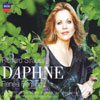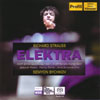Strauss Elektra
Bychkov’s Strauss deservedly stands beside the best
View record and artist detailsRecord and Artist Details
Composer or Director: Richard Strauss
Genre:
Opera
Label: Decca
Magazine Review Date: 11/2005
Media Format: CD or Download
Media Runtime: 100
Mastering:
Stereo
DDD
Catalogue Number: 475 6926DH2

Tracks:
| Composition | Artist Credit |
|---|---|
| Daphne |
Richard Strauss, Composer
Anna Larsson, Gaea Carsten Wittmoser, Shepherd IV Cologne Radio Chorus (Men) Cologne Radio Symphony Orchestra Cosmin Ifrim, Shepherd II, Tenor Eike Wilm Schulte, Shepherd I, Baritone Gregory Reinhart, Shepherd III, Bass Johan Botha, Apollo, Tenor Julia Kleiter, Maiden I, Soprano Kwangchul Youn, Peneios, Baritone Michael Schade, Leukippos, Tenor Renée Fleming, Daphne, Soprano Richard Strauss, Composer Semyon Bychkov, Conductor Twyla Robinson, Maiden II |
Composer or Director: Richard Strauss
Genre:
Opera
Label: Profil
Magazine Review Date: 11/2005
Media Format: Super Audio CD
Media Runtime: 107
Mastering:
Stereo
DDD
Catalogue Number: PH05022

Tracks:
| Composition | Artist Credit |
|---|---|
| Elektra |
Richard Strauss, Composer
Alfred Walker, Tutor, Bass Anne Schwanewilms, Chrysothemis, Soprano Christiane Hossfeld, Confidante, Soprano Deborah Polaski, Elektra, Soprano Felicity Palmer, Klytemnestra, Mezzo soprano Franz Grundheber, Orestes, Baritone Graham Clark, Aegisthus, Tenor Richard Strauss, Composer Semyon Bychkov, Conductor West German Radio Chorus West German Radio Orchestra |
Author: Alan Blyth
In some ways the title-role might have been written for Renée Fleming’s succulent, expansive voice and she fills Strauss’s taxing yet rewarding line with the glowing warmth it calls for, while at the same time paying more attention than has sometimes been the case to fashioning the text. Only in the highest reaches of a part whose tessitura is cruelly high does she show occasional signs of wear on her voice, and someone should have pointed out that the final vowel of ‘Daphne’ should not sound ‘ay’. As a whole, she enters in the successively ingenuous, then enraptured character of the part.
Strauss demands perhaps even more of his principal tenor. If Bacchus in Ariadne is considered a challenge, Apollo here is even more of one, but not for Botha who throws out top B flats and Bs as if there were no tomorrow. He also suggests along the way most of the god’s essential and dominating ardour. As the lovelorn Leukippos, Schade is reasonably well suited. In the amazingly low contralto part of Gaea, Anna Larsson copes splendidly; and Kwangchoul Youn does what he can with the under-characterised part of Peneios.
Excellent as the new performance may be in many respects, it faces strong competition from rival sets, especially from the 41-year-old but still fine-sounding live Böhm version from 1964. With the Vienna Philharmonic incomparable in Strauss and Böhm in his most urgent form as a Strauss interpreter, the work is played for all its worth. Gueden gives her most inspired performance on disc, has all the top notes firmly in her grasp and at the same time delivers the role in a deeply touching way with the support almost as good, most notably Wunderlich’s Leukippos. Böhm makes a few cuts but these can be easily borne.
Haitink in 1983 is hampered by a recessed recording and Lucia Popp, for all her eloquent advocacy of the title-role, is strained on high. That classic Straussian soprano Maria Reining, in the historic Viennese performance of 1944 on Preiser, also conducted by Böhm, is vocally the sweetest, dramatically most affecting Daphne of all but her basically lirico-spinto voice forces her to make a few adjustments to the vocal line on high. She is supported by the most convincing of tenors: the impulsive, fierily impassioned Karl Friedrich as Apollo and Anton Dermota as an appropriately plangent Leukippos. The sound, for its day, is astonishingly faithful to the score.
Of course, with Elektra, the available versions present an even stronger test to any newcomer. Bychkov just about stands comparison with the list of notable Strauss conductors above, able at once to encompass the harsh, sensational aspects evincing the dysfunctional House of Atreus and the many moments where the delicacy of Strauss’s writing is foremost. So there are both intensity and subtler attributes in this finely played reading; but that can be said of all the other recommendable sets. Bychkov opts for the complete score, and seriously challenges the hegemony of Solti’s more excitable reading and Sawallisch’s lower key one, coming somewhere in between. He is probably most faithfully recorded of all (Haas again in charge), although Barenboim’s version is in the same class.
Polaski was also Barenboim’s Elektra. Her portrayal here is perhaps more involving than it was then but the two are similar in character, aware of most sides of the vocally horrendous role but, as before, her highest notes are unfocused and she sometimes sounds flustered – faults Solti’s Nilsson avoids. Nor does she have the ultimate in pathos for the passages before and after the Recognition scene, where Hildegard Behrens for Ozawa, even more Inge Borkh, particularly heard live for Mitropoulos, are supreme; indeed Borkh remains my preferred interpreter of the part but, both for Mitropoulos and Böhm (in the studio), the score suffers the traditional theatre cuts.
Schwanewilms gives a thrilling account of Chrysothemis’ high-lying role, in the manner of Leonie Rysanek (Kraus, 1953; Gala – nla) and superior to other rivals (Barenboim’s Marc is especially weak here). Palmer, who makes speciality of Klytämnestra, gives a marvellous portrayal of a raddled, frightened woman, able to match the equally engrossing performances of Waltraud Meier (Barenboim) and Jean Madeira for Mitropoulos and Böhm. Grundheber combines menace and warmth in just the right proportions as Orest and comes close to Hotter’s classic portrayal (Kraus). As Aegisth, Graham Clark adds another portrait to his gallery of eccentrics, with special praise for his precise treatment of text and notes.
While not toppling the previous front-runners from their ascendancy, this is a superbly recorded, highly charged version which does justice to a work that still has the power to shock and amaze after almost a century’s existence.
Discover the world's largest classical music catalogue with Presto Music.

Gramophone Digital Club
- Digital Edition
- Digital Archive
- Reviews Database
- Full website access
From £8.75 / month
Subscribe
Gramophone Full Club
- Print Edition
- Digital Edition
- Digital Archive
- Reviews Database
- Full website access
From £11.00 / month
Subscribe
If you are a library, university or other organisation that would be interested in an institutional subscription to Gramophone please click here for further information.




